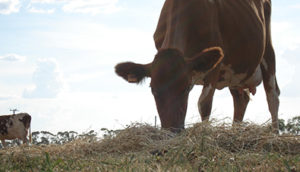Read the latest information on
Foot-and-mouth disease
 Australia is free of many serious diseases of livestock, due to our geographic isolation and our commitment to biosecurity and animal health. As a result of this, Australia’s red meat sector enjoys a high degree of access to international markets, along with a reputation of quality and the confidence of our consumers.
Australia is free of many serious diseases of livestock, due to our geographic isolation and our commitment to biosecurity and animal health. As a result of this, Australia’s red meat sector enjoys a high degree of access to international markets, along with a reputation of quality and the confidence of our consumers.
With the health of our livestock in mind, our governments and industries have agreed it’s best not to feed our livestock restricted animal material (RAM). RAM is any material from a vertebrate animal, other than tallow, gelatin, Australian milk products or oils.
“One of the groups of diseases which we are thankfully free from are what we call transmissible spongiform encephalopathies (TSEs), including scrapie in sheep and bovine spongiform encephalopathy (BSE) or mad cow disease,” says Animal Health Australia’s (AHA) Executive Manager for Biosecurity and Product Integrity Services, Dr Simon Humphrys.
“TSEs are called that because they can be transmitted between animals, as well as to humans, and this transmission has been linked in the case of BSE to animals consuming material from another infected animal.”
For nearly 25 years, the Ruminant Feed Ban has helped to prevent TSEs, occurring in Australia. The Ruminant Feed Ban prohibits the feeding of any feed containing RAM to ruminants, including cattle, sheep, goats and deer, in all states and territories by law.
This helps to prevent the possible compounding effect where, if infected animals were processed into stock feed, they could go on to infect many more animals, as happened in the UK in the late 1980s.
Due to the collaborative efforts of the livestock and stock feed industries and the various state and territory governments, Australia is free of TSEs and other diseases of significance.
“It is this collaboration between the states and territories in Australia that has helped us to keep our BSE-negligible risk status and ensure the provision of safe beef, and beef products”, says Dr Humphrys.
“It is important to maintain this disease-free status as it enables Australia to maintain our extensive international markets and the advantages conferred by not having to manage these diseases.”
It is every livestock producer’s responsibility to adhere to the Ruminant Feed Ban as part of their on-farm biosecurity practices. Sticking to the rules of the Ruminant Feed Ban is quite straightforward – don’t feed ruminants any product containing RAM.
RAM includes rendered products, such as blood meal, meat meal, meat and bone meal, fish meal, poultry meal, eggs, feather meal, and compounded feeds made from these products as the prions that cause the diseases aren’t inactivated through that processing. By law, feeds containing RAM must be clearly labelled with a directive that they are not be fed to ruminants.
“Teamwork has helped to keep us free of these diseases, and together we can continue to safeguard our animals and our livestock industries,” Dr Humphrys says.
“Lastly, if you’re in doubt, play it safe and don’t feed it!”
Find out more about the Ruminant Feed Ban via Animal Health Australia.
More biosecurity tips for purchasing, storing and managing your feed can be found on the Farm Biosecurity website.